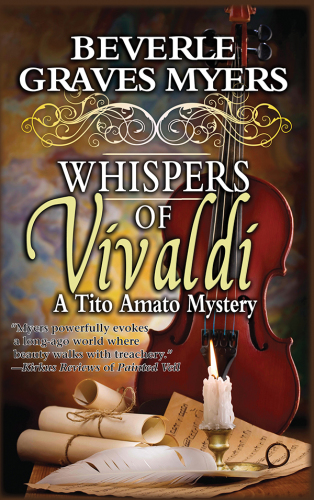
Whispers of Vivaldi
Tito Amato Mystery Series, Book 6
- اطلاعات
- نقد و بررسی
- دیدگاه کاربران
نقد و بررسی

November 11, 2013
The twin plot is so old, it should come wearing whiskers.” So says the protagonist of Myers’s sixth Tito Amato mystery set in 18th-century Venice. Amato, a castrato, was an opera star until vocal problems forced career change upon him. His challenge, to revive the flagging fortunes of his beloved Teatro San Marco by replacing a formulaic opera of modest merit with a newly discovered one of wondrous content and mysterious origin, makes him a snake pit of enemies. Among them are impresarios, musicians, stage managers, gigolos, potentates, and even another castrato. One of them murders his mentor and friend, Maestro Torani, director of the Teatro. It seems everyone is a legitimate suspect. Myers has a lot going for her. Venice was an even more exotic setting in the 18th century, for which Myers has a nimble and comprehensive grasp, than it is today. She keeps the story flowing as fast as a gondola in aqua alta, yet successfully avoids running aground. She has created an intelligent, compassionate, artistic hero in Tito Amato, devotedly loyal to his art and to Torani. If there is anything to question, it is an occasional surfeit of sensory stimuli, like the onstage birds and wind machines that Venetian opera reveled in. Myers’s descriptions, though evocative and undoubtedly accurate, sometimes distracted me from the heart of the tale: “I stopped so suddenly, a bearded Turk with white linen wound around his head crashed into me. I was oblivious to his Arab curses and the flapping of rising pigeons.” Also giving me pause were some overly rich analogies (e.g., “I imagined myself laced with the cold burn, much as Gussie’s milky Christmas syllabub was laced with fire-warmed brandy”) and the occasional jarringly time-displaced phrase (e.g., “If that were true, I was the Bey of Constantinople”). In addition, I would have loved more insight into the castrato psyche, which, after all, is what makes Amato a unique hero. Yet, miraculously, he seems emotionally unscathed by castration. Surely there must be a dark side. Myers mostly addresses professional castration on a practical level: “Once he’d been relieved of his balls, he attacked his lessons with great determination. I suppose he realized that he must succeed as a singer or live the rest of his years as a figure of disdain and pity.” Those issues notwithstanding, Whispers of Vivaldi has all the elements of a rollicking opera buffa; I found myself constantly changing bets on whom the ultimate villain would be (and I was fooled every time). Though one need not be a music lover to savor the book, it may well stimulate readers to listen to Vivaldi’s magic. If so, so much the better. To quote Amato, “We’ll make beautiful music here.” Gerald Elias, author of Devil’s Trill and three other Daniel Jacobus mysteries set in the dark corners of the classical music world, is a violinist formerly with the Boston Symphony and is an internationally recognized concert artist.

January 1, 2014
Difficult Maestro Torani is killed during preparations for Venice's Carnival. Tito must sleuth fast since he's a prime suspect in this intricate historical set in 1745. This is the sixth outing for the castrato opera singer/director (after 2009's Her Deadly Mischief).
Copyright 2014 Library Journal, LLC Used with permission.

December 1, 2013
Operatic rivalry leads to death in Venice. Venetians take their opera very seriously in 1745. Once, the castrato Tito Amato was their darling. Retired now, he is trying to help Maestro Torani, director of Teatro San Marco, win back audiences from a competing company. Tito hopes that an innovative opera, The False Duke, by Niccolo Rocatti, a former student of the late, great Vivaldi, will do the trick. Tito gets permission from patrician cultural adviser Signor Arcangelo Passoni to mount the opera on one condition: Young castrato Angeletto must sing the female lead. When Torani is murdered at a reception honoring Angeletto, Tito is devastated. Torani was closer to him than his own father. But the more he uncovers about the murder, the more puzzles arise: the defection of Torani's mistress, a murky connection between Rocatti and the Signora Passoni, tarot cards that appear in unexpected places, and the riddle of whether Angeletto is a man or a woman. Although Tito is an unlikely hero--castrated as a child, forced to give up the stage when an accident cost him his voice, resigned to living in an unsanctioned marriage with his beloved pagan wife--he pursues his investigation to a satisfying conclusion. Myers (Her Deadly Mischief, 2009, etc.) has perhaps too painstakingly recreated 18th-century Venice; the plot is very slow to start rolling, even with the help of a gondola chase. The fully realized hero, however, makes up for flaws in pace and plausibility.
COPYRIGHT(2013) Kirkus Reviews, ALL RIGHTS RESERVED.




دیدگاه کاربران